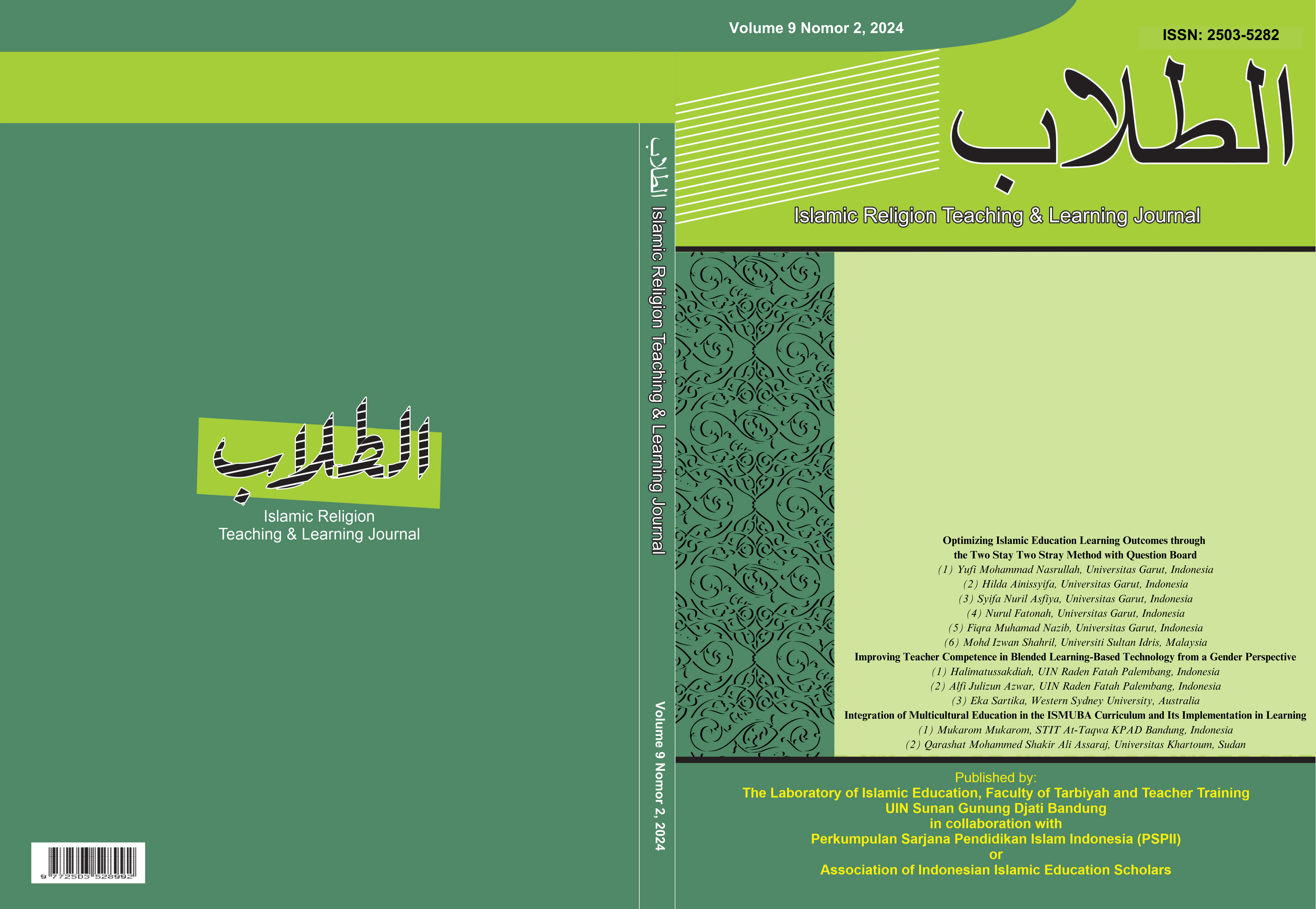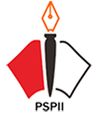Integration of Multicultural Education in the ISMUBA Curriculum and Its Implementation in Learning
DOI:
https://doi.org/10.15575/ath.v9i2.30605Keywords:
ISMUBA Curriculum, Learning, MulticulturalAbstract
This study aims to explore the Multicultural education content in the ISMUBA curriculum and its implementation in learning at SMA Muhammadiyah 4 Bandung City. Using a qualitative descriptive method, the research describes conditions in curriculum documents and field observations related to learning. Data were collected through observation, interviews, and documentation, and analyzed using data triangulation by reducing, presenting, and concluding the data. The findings reveal that the ISMUBA curriculum, which is unique to educational institutions under Muhammadiyah, is an integrative-holistic modern Islamic education system developed to meet community needs. Based on decree 98/KEP/I.4/F/2017, the curriculum focuses on instilling faith, piety, and strong Islamic values, rooted in the Qur'an and Hadith. Multicultural education is embedded in the curriculum’s structure, process, teachers, and assessments. Implementation at SMA Muhammadiyah 4 involves face-to-face learning, habituation, structured and unstructured independent activities, fostering Islamic character, honesty, care, politeness, and responsibility. Abstrak: Penelitian ini bertujuan untuk mengkaji pendidikan multikultural dalam kurikulum ISMUBA serta penerapannya dalam pembelajaran di SMA Muhammadiyah 4 Kota Bandung. Penelitian ini Menggunakan metode deskriptif kualitatif, penelitian ini menggambarkan kondisi dalam dokumen kurikulum dan hasil observasi di lapangan terkait pembelajaran. Data dikumpulkan melalui observasi, wawancara, dan dokumentasi, serta dianalisis menggunakan triangulasi data dengan mereduksi, menyajikan, dan menarik kesimpulan. Temuan menunjukkan bahwa kurikulum ISMUBA, yang merupakan kekhasan lembaga pendidikan di bawah naungan Muhammadiyah, adalah sistem pendidikan Islam modern yang integratif-holistik yang dikembangkan untuk memenuhi kebutuhan masyarakat. Berdasarkan SK 98/KEP/I.4/F/2017, kurikulum ini berfokus pada penanaman keimanan, ketakwaan, dan nilai-nilai Islam yang kuat, yang berakar pada Al-Qur'an dan Hadits. Pendidikan multikultural tercermin dalam struktur, proses, tenaga pengajar, dan penilaian dalam kurikulum tersebut. Penerapan di SMA Muhammadiyah 4 mencakup pembelajaran tatap muka, pembiasaan, tugas terstruktur, dan aktivitas mandiri yang tidak terstruktur, yang bertujuan membentuk karakter Islam, kejujuran, kepedulian, kesantunan, dan tanggung jawab.References
Alamsyah, A., Prafitri, W., & Nasir, M. A. A. (2023). Sociocultural Multiculturalism in New Capital of Indonesia IKN Nusantara: Academic and Student Perspectives. International Journal of Linguistics and Indigenous Culture, 1(1), 1–10. https://doi.org/https://doi.org/10.36312/ijlic.v1i1.1584
Arsal, Z. (2019). Critical multicultural education and preservice teachers’ multicultural attitudes. Journal for Multicultural Education, 13(1), 106–118. https://doi.org/https://doi.org/10.1108/JME-10-2017-0059
Barton, K. C., & Ho, L.-C. (2020). Cultivating sprouts of benevolence: A foundational principle for curriculum in civic and multicultural education. Multicultural Education Review, 12(3), 157–176. https://doi.org/https://doi.org/10.1080/2005615X.2020.1808928
Dewantara, J. A., Budimansyah, D., Darmawan, C., Martono, Prasetiyo, W. H., & Sulistyarini. (2024). Language, Cultural Sentiments, and Ethnic Conflict: Understanding Verbal Violence and Discrimination in Multi-Ethnic Schools in West Kalimantan, Indonesia. Journal of Language, Identity & Education, 1–17. https://doi.org/https://doi.org/10.1080/15348458.2024.2408451
Fatmawati, E. (2021). Strategies to grow a proud attitude towards Indonesian cultural diversity. Linguistics and Culture Review, 5(S1), 810–820. https://doi.org/https://doi.org/10.21744/lingcure.v5nS1.1465
Hidayat, A. F. S., Huda, M., Amalia, D. R., Suja, A., & Sulaikho, S. (2022). The Integration of Character Education in Arabic Learning at Muhammadiyah Elementary School 4 Samarinda. Borneo International Journal of Islamic Studies (BIJIS), 4(2), 58–79. https://doi.org/https://doi.org/10.21093/bijis.v5i1.5483
MacPherson, S. (2018). Ethno-cultural diversity education in Canada, the USA and India: The experience of the Tibetan diaspora. Compare: A Journal of Comparative and International Education, 48(6), 844–860. https://doi.org/https://doi.org/10.1080/03057925.2017.1362547
Mpuangnan, K. N., & Ntombela, S. (2024). The curriculum is a crucial component in the educational process, serving as a reflection of societal ideals, aspirations, demands, and specific needs. Curriculum Perspectives, 44(1), 49–60. https://doi.org/https://doi.org/10.1007/s41297-023-00223-w
Mufti, U. (2020). Implementasi Kurikulum Ismuba di sekolah muhammadiyah. AL-MANAR: Jurnal Komunikasi Dan Pendidikan Islam, 9(2), 29–44. https://doi.org/https://doi.org/10.36668/jal.v9i2.188
Mufti, U., & Widodo, H. (2021). Kurikulum ISMUBA di SD Muhammadiyah Banguntapan. Journal of Islamic Education and Innovation, 2(1), 85–92. https://doi.org/https://doi.org/10.26555/jiei.v2i1.906
Mundofi, A. A., Manggali, C. A., & Hayati, D. N. (2024). Comparative Study of Lp Ma’arif Nu Curriculum Development And Ismuba Curriculum. Jurnal PAI Raden Fatah, 6(1), 479–491. https://doi.org/https://doi.org/10.19109/bkcnq971
Naim, N., & Sauqi, A. (2008). Pendidikan Multikultural Konsep dan Aplikasi. Ar-Ruz Media.
Peterson, J. S. (2019). Presenting a Qualitative Study: A Reviewer’s Perspective. Gifted Child Quarterly, 63(3), 147–158. https://doi.org/https://doi.org/10.1177/0016986219844789
Putra, R. S., Tri, S. U., & Haris, A. (2023). Policy for Implementing The Merdeka Curriculum in ISMUBA Subject In The Era Social Dusruption and Society Revolution 5.0. Tarlim: Jurnal Pendidikan Agama Islam, 6(2), 203–212. https://doi.org/https://doi.org/10.32528/tarlim.v6i2.989
Raihani, R. (2018). Education for multicultural citizens in Indonesia: policies and practices. Compare: A Journal of Comparative and International Education, 48(6), 992–1009. https://doi.org/https://doi.org/10.1080/03057925.2017.1399250
Richards, K. A. R., & Hemphill, M. A. (2018). A practical guide to collaborative qualitative data analysis. Journal of Teaching in Physical Education, 37(2), 225–231. https://doi.org/https://doi.org/10.1123/jtpe.2017-0084
Seaman, J. (2019). Restoring culture and history in outdoor education research: Dewey’s theory of experience as a methodology. Journal of Outdoor Recreation, Education, and Leadership, 11(4). https://doi.org/https://doi.org/10.18666/JOREL-2019-V11-I4-9582
Suri, D., & Chandra, D. (2021). Teacher’s strategy for implementing multiculturalism education based on local cultural values and character building for early childhood education. Journal of Ethnic and Cultural Studies, 8(4), 271–285.
Syomwene, A. (2020). Curriculum theory: characteristics and functions. European Journal of Education Studies, 7(1). https://doi.org/http://dx.doi.org/10.46827/ejes.v0i0.2935
Vakhovskyi, L. (2023). Philosophy of Education and Pedagogy: Peculiarities of Interaction. The Journal of Education, Culture, and Society, 14(2), 19–29.
Wibowo, G. (2023). Implementation of Al-Islam Kemuhammadiyahan and Arabic Language (ISMUBA) Curriculum and Hizbul Wathon Scouting Movement Program in Character Building of Junior High School Students. Scaffolding: Jurnal Pendidikan Islam Dan Multikulturalisme, 5(1), 206–223. https://doi.org/https://doi.org/10.37680/scaffolding.v5i1.2368
Widodo, H., Sulastri, Jailani, M., & Huda, M. (2024). The Implementation of Project Based-Learning as ISMUBA Curriculum Development in Muhammadiyah Schools. TADRIS: Jurnal Pendidikan Islam, 19(1), 142–160. https://doi.org/https://doi.org/10.19105/tjpi.v19i1.10169
Downloads
Published
How to Cite
Issue
Section
License
Authors who publish with this journal agree to the following terms:
- Authors retain copyright and grant the journal right of first publication with the work simultaneously licensed under a Creative Commons Attribution-ShareAlike License that allows others to share the work with an acknowledgement of the work's authorship and initial publication in this journal.
- Authors are able to enter into separate, additional contractual arrangements for the non-exclusive distribution of the journal's published version of the work (e.g., post it to an institutional repository or publish it in a book), with an acknowledgement of its initial publication in this journal.
- Authors are permitted and encouraged to post their work online (e.g., in institutional repositories or on their website) prior to and during the submission process, as it can lead to productive exchanges, as well as earlier and greater citation of published work (See The Effect of Open Access).






